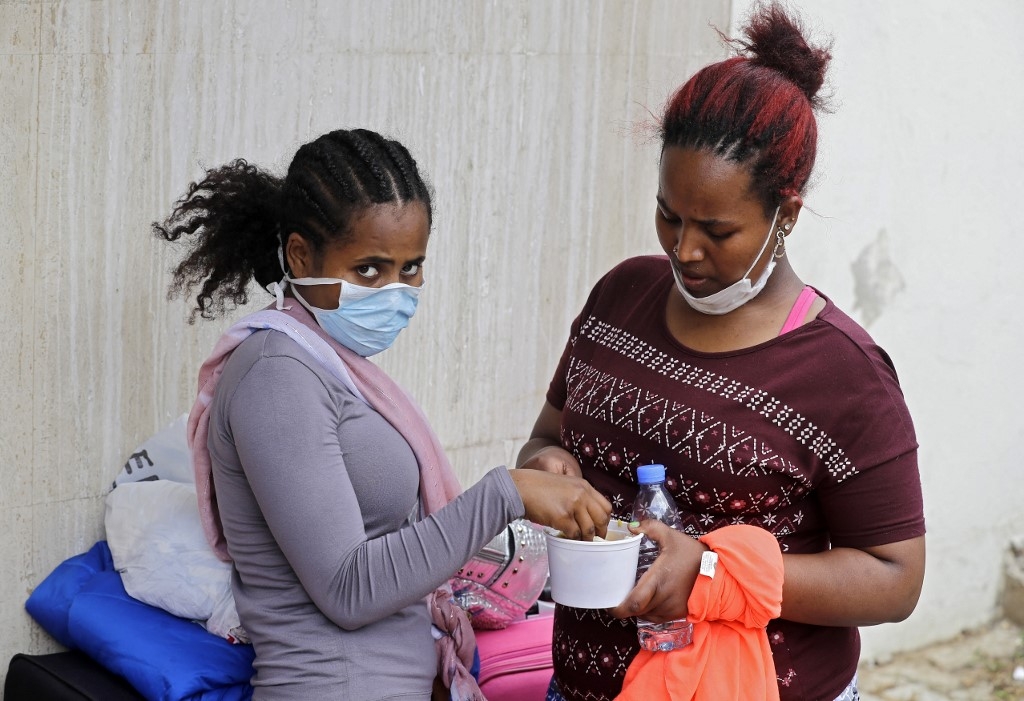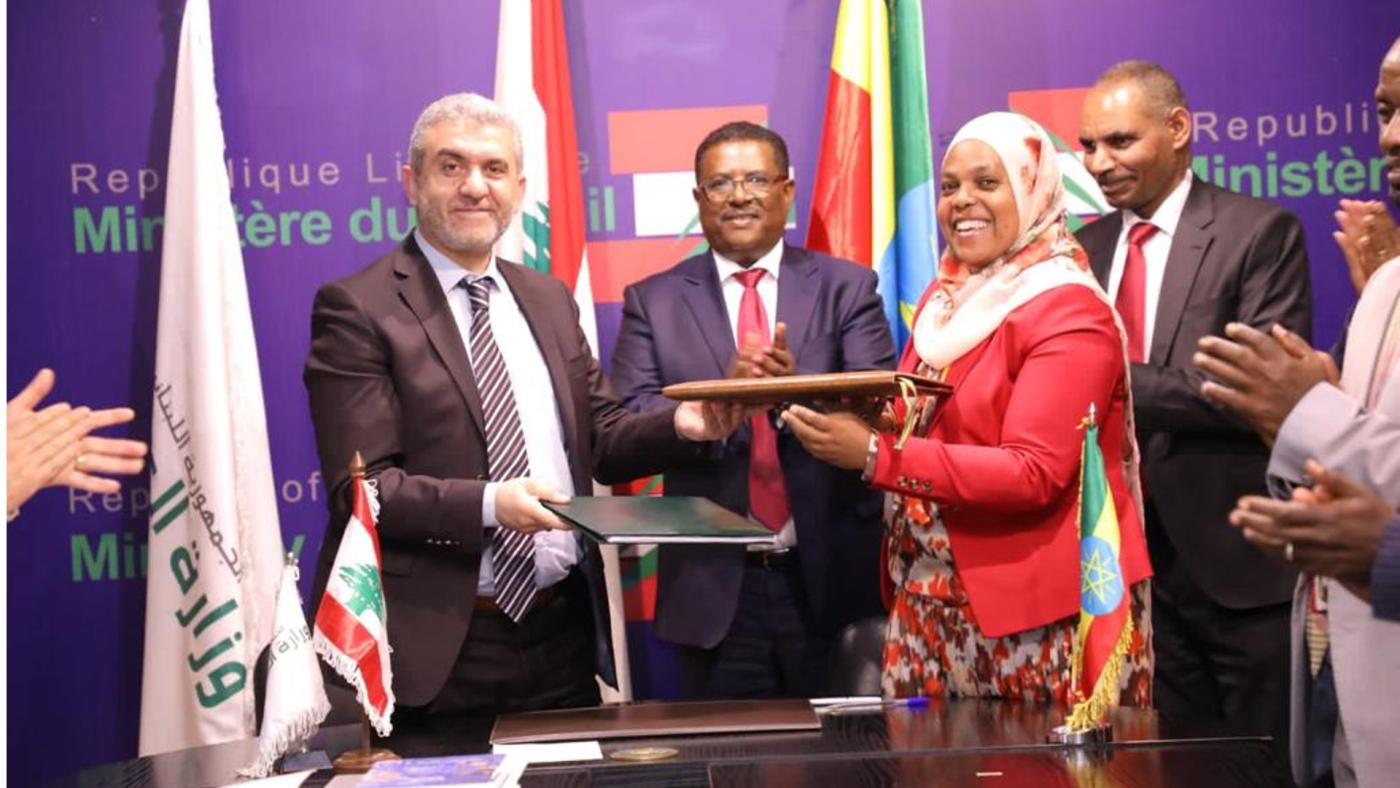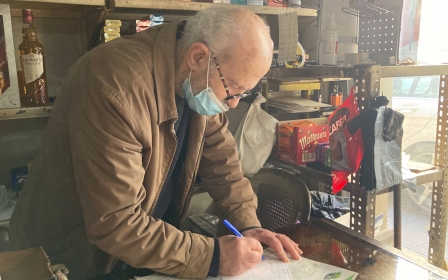Ethiopia-Lebanon labour agreement contains little protection for domestic workers

A recent bilateral labour agreement signed by Ethiopia and Lebanon contains no minimum salary requirements and offers scant legal protection for hundreds of thousands of Ethiopian workers in the country, Middle East Eye can reveal.
The agreement, which was signed in April but never made public, received positive coverage in Lebanese and Ethiopian media at the time.
“Among the main things included in the agreement, a meaningful raise in worker salaries, freedom of movement, annual leave, healthcare and interaction with family,” Muferiat Kamil, Ethiopia’s labour and skills minister, wrote on her Facebook page in April.
But a 12-page draft of the agreement and an accompanying eight-page worker contract, obtained and authenticated by MEE, casts doubt on its effectiveness to protect workers.
The agreement does not include a minimum wage, relies on Lebanese laws which do not apply to migrant workers, and could open the way for passport confiscation.
New MEE newsletter: Jerusalem Dispatch
Sign up to get the latest insights and analysis on Israel-Palestine, alongside Turkey Unpacked and other MEE newsletters
MEE shared the document with researchers at Human Rights Watch.
“[The agreement] does not include a minimum salary for domestic workers, and much of the provisions relate to what is provided by Lebanese law or to other foreign nationals, which is very weak and non-existent,” Rothna Begum, a senior women’s rights researcher at Human Rights Watch, told MEE.
Sections of the agreement cite Lebanese legislation, including a pledge that Ethiopian workers, estimated to number more than 400,000 in 2020, would enjoy “the same privileges and protections” as other foreign workers.
“Lebanon’s labour law excludes domestic workers and there are no other laws for domestic worker rights,” said Begum.
She added that instead of measures to prevent abuses, such as training employers on how to ensure workers' rights, the agreement put the onus on the domestic workers to get training and seek necessary information.
History of abuses
Since the 1980s, women from developing countries in Asia and Africa have flocked to the Middle East for low-paying jobs as housekeepers, with Lebanon among the choice destinations.
But scores of Ethiopian workers have died in Lebanon over the past two decades as a result of suicides, accidental deaths and murders that are rarely investigated by Lebanese or Ethiopian authorities.
In 2017, at least two migrant domestic workers in Lebanon were estimated to die weekly. Others have gone missing for years.
A recent study revealed that over two-thirds of workers in the country experienced sexual harassment on the job.
Foreign workers have their status regulated by the discriminatory “kafala” or sponsorship system, which ties a worker’s legal status to their employer and denies them the right to flee the workplace, even in cases of extreme abuse.
'Lebanon’s labour law excludes domestic workers and there are no other laws for domestic worker rights'
- Rothna Begum, HRW
The kafala system, used across much of the Middle East to regulate foreign employment, has been described by human rights activists as modern-day slavery.
Kafala-enabled abuse led to Ethiopia implementing a ban on labour migration to Lebanon in 2008, but it has never been properly enforced.
In 2020, Lebanon’s former labour minister, Camille Abousleiman, called his failure to abolish the kafala system his biggest regret and a “stain on Lebanon’s reputation”.
Later that same year, his successor Lamia Yammine proposed moderate reforms to the formal worker contract, but her proposal was blocked when a collective of Lebanese foreign worker recruitment agencies appealed to the country’s highest administrative court, claiming their interests would be negatively impacted.
Passport confiscation
Ethiopia's 15-year ban on economic migration to Lebanon was officially lifted on 11 April, as labour ministers from both countries met in Beirut to sign the agreement.
However, the draft text contains wording that an expert told MEE could legitimise passport confiscation.
Lebanese employers often confiscate their workers’ passports as a way of preventing them from running away, leaving them trapped and unable to flee the country.
Dr Mehari Taddele Maru, a professor at the School of Transnational Governance and Migration Policy Centre at the European University Institute, took issue with a section promising a crackdown on “unlawful withholding of [workers’] passports”.
“The inclusion of the term 'unlawful' appears to suggest that there is confiscation of passports that could be considered lawful,” he told MEE.
“Passport seizure should be considered unlawful by default. Adding an adjective opens the door for the law to decide what form of seizure by employers would be deemed legal or illegal, and there can be no guarantees for workers who are already excluded from legal protections.”
Taddele Maru commended parts of the agreement which cited human rights and International Labour Organisation standards, deeming it an improvement from previous pacts. But most of the document fell back on local legislation, which he said was “a deliberate ambiguity”.
MEE reached out to Kamil and members of her office, but did not hear back. A text message and email to Lebanon’s Labour Minister Moustafa Bayram also went unanswered.
In a post on its official Facebook page in April, the Ethiopian Ministry of Skills and Labour described the signed agreement as one that “fulfils standards for human rights and those of the International Labor Organisation”.
Economic collapse hits workers
The agreement comes just four years into a crippling economic crisis Lebanon, with most nationals no longer able to afford to hire domestic workers.
By 2021, the UN estimated that three-quarters of Lebanon’s population lived below the poverty line.
Prior to Lebanon’s economic crisis in 2019, Ethiopian domestic workers had been among the lowest paid in the country, earning around $150 monthly. But with the severe shortage of foreign currency, Lebanese civil servants are now barely earning $50 each month.
'The problem with any agreement in Lebanon is enforcement'
- Jad Chaaban, economist
Labour agreements are unlikely to be effective amid that backdrop, according to one economist.
“The problem with any agreement in Lebanon is enforcement. Labour laws (and any laws) in the country haven’t been sufficiently enforced and informal side agreements remain the norm,” Jad Chaaban, economist and professor at the Lebanese American University, told MEE.
“Even if the government were to commit to a minimum pay for migrant workers, there are no mechanisms in place to apply this and prosecute those who don’t abide by it.”
Lebanon’s multiple crises in recent years, including the Covid-19 pandemic, the Beirut port explosion and the economic collapse, have added to the woes of migrant workers.
In 2020, scores of African domestic workers were abandoned on the streets by their employers who were unable or unwilling to pay their salaries.
“It was no longer realistic to find work, let alone jobs that paid $150 monthly,” Zertihun Gizachew, a 34-year-old former domestic worker who returned to Ethiopia in 2020, told MEE.
“Now, they only pay you in Lebanese pounds, which are worthless. That’s why I decided to leave.”
Ethiopia seeks remittance
Ethiopia is dealing with its own troubles, after a civil war which began in 2020 left hundreds of thousands dead and its economy on the brink of ruin.
A peace treaty signed in November ended conflict in the northern Tigray region. Now the country is hoping migrant workers in the Middle East can inject badly needed foreign currency into the economy through remittances.
But deals are being signed with states that have been criticised over migrant rights abuses.
In February, Ethiopia agreed to recruit 500,000 women for domestic work in Saudi Arabia, plans that have been condemned by rights activists. Kuwait is also set to sign an agreement with Ethiopia, despite its troubled history with foreign labourers.
In each case, the negotiation process has lacked transparency and the signed agreements are never made public. The document leaked to MEE offers a rare glimpse of the paperwork behind the controversial deals.
Begum described such bilateral agreements as "weak" and "not effective" as they lack "legal protections like labour laws".
Middle East Eye delivers independent and unrivalled coverage and analysis of the Middle East, North Africa and beyond. To learn more about republishing this content and the associated fees, please fill out this form. More about MEE can be found here.






